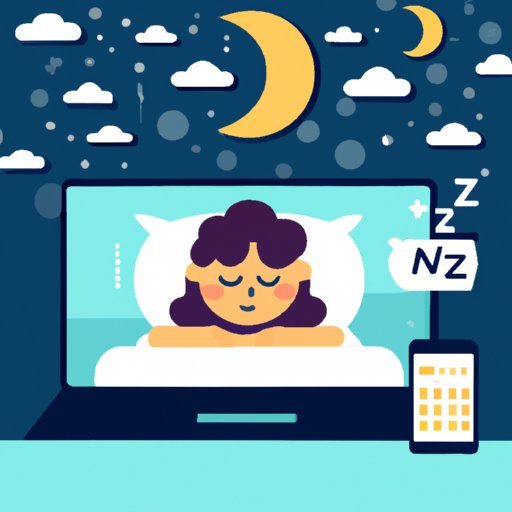
Introduction
Do you struggle to get a good night’s sleep? You’re not alone. According to the National Sleep Foundation, around 35% of adults in the United States experience sleep problems, ranging from insomnia to snoring to sleep apnea. Sleep is essential for our overall health and well-being, as it allows our body to rest and restore itself. In this article, we will discuss seven effective ways to get a good night sleep, so you can wake up feeling refreshed and energized!
Establishing a Relaxing Pre-Sleep Routine
Establishing a pre-sleep routine is essential to prepare your body and mind for sleep. It’s recommended to start winding down at least an hour before bedtime to let your body relax.
Taking a Warm Bath
A warm bath is an excellent way to relax before bedtime. It helps lower your body temperature, which signals your brain to produce melatonin, a hormone that regulates the sleep-wake cycle. You can also add Epsom salt or lavender oil to the bath, which can help you relax even more.
Reading
Reading a book before bed is a great way to relax your mind. It has a soothing effect on your brain and can help you fall asleep faster. However, avoid reading on an electronic device as the blue light emitted by electronic screens can disrupt your sleep cycle.
Meditating
Meditation is a powerful tool for relaxation, and it can help you clear your mind and prepare your body for sleep. You can try simple breathing techniques or guided meditations to help promote relaxation.
Maintaining a Regular Sleep Schedule
Establishing a regular sleep schedule is crucial for a good night’s sleep. It helps regulate your body’s internal clock, making it easier to fall asleep and wake up at the same time every day.
Setting a Regular Wake-Up Time and Bedtime
Setting a regular wake-up time and bedtime can help you maintain a consistent sleep schedule. This will help your body establish a sleep-wake rhythm, making it easier to fall asleep and wake up naturally. Even on weekends, try to maintain the same sleep schedule to avoid disrupting your internal clock.
Consistency for Better Sleep Rhythm
Consistency in your sleep schedule is essential for good sleep hygiene. It’s important to note that if you have trouble sleeping, napping during the day can interfere with your sleep cycle at night.
Creating a Comfortable Sleep Environment
The environment in which you sleep can significantly impact your sleep quality. It is essential to create a comfortable sleep environment to promote a peaceful night’s sleep.
Importance of Sleep Environment
Your sleep environment plays a significant role in getting a good night’s sleep. A comfortable bed and a noise-free room are essential for a peaceful sleep experience.
Comfortable Mattress and Pillow
Investing in a comfortable mattress and pillows can improve your sleep quality significantly. A firm but not too hard mattress aligns the spine, reducing the chances of lower back pain and other aches.
Adjust the Temperature and Lighting
The ideal temperature for sleep is between 60°F and 67°F. Keeping the bedroom cooler is helpful in promoting sleep as it helps to lower your core body temperature. Additionally, using dim lights, blackout curtains, or an eye mask can help regulate your circadian rhythm.
Limiting Exposure to Electronic Screens Before Bed
Electronic devices emit blue light that can interfere with your body’s natural sleep cycle, making it harder for you to fall asleep.
Explanation of Why Electronic Screens Affect Sleep Quality
The blue light emitted from electronic screens can interfere with your circadian rhythm, making it harder for your body to produce melatonin, the hormone that regulates sleep. This, in turn, makes it harder to fall asleep and stay asleep.
Limiting Screen Time Before Bed
Limiting your exposure to electronic screens before bedtime can help improve your sleep quality. Ideally, turn off electronic devices at least an hour before bedtime to allow your body to relax.
Ways to Reduce Exposure to Electronic Screens
You can use blue light filtering glasses, install blue light filters on your devices, or switch to low light mode to reduce the blue light emitted by your devices.
Managing Stress Levels
Stress and anxiety are two of the leading causes of poor sleep quality. Managing your stress levels can help you relax and fall asleep more easily.
Stress and Sleep Connection
Stress and anxiety can significantly impact your sleep quality, making it harder for you to fall asleep and stay asleep.
Relaxation Techniques
Relaxation techniques such as deep breathing, yoga, or progressive muscle relaxation can help you calm your mind and relax your body.
Deep Breathing
Deep breathing exercises can help you calm down and reduce stress. Take deep breaths in and out, slowly and steadily, until you begin to feel relaxed.
Yoga
Yoga is a popular relaxation technique that helps reduce stress and improve sleep. Try simple yoga poses such as child’s pose or downward dog to help calm your mind and relax your body.
Avoid Caffeine and Alcohol
Avoiding caffeine and alcohol before bed is essential as they can interfere with your sleep quality. Caffeine is a stimulant that can make it harder for you to fall asleep, while alcohol can disrupt your sleep cycle, causing you to wake up frequently during the night.
Other Ways to Manage Stress
You can also try other relaxation techniques such as reading, taking a warm bath, or listening to calming music to help reduce stress and anxiety before bed.
Conclusion
Getting a good night’s sleep is essential for overall health and well-being, and there are many ways to achieve it. By establishing a pre-sleep routine, maintaining a regular sleep schedule, creating a comfortable sleep environment, limiting screen time, and managing stress levels, you can improve your sleep quality and achieve a restful night’s sleep.




